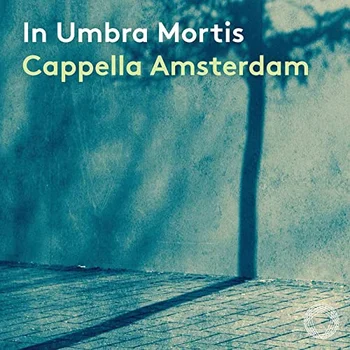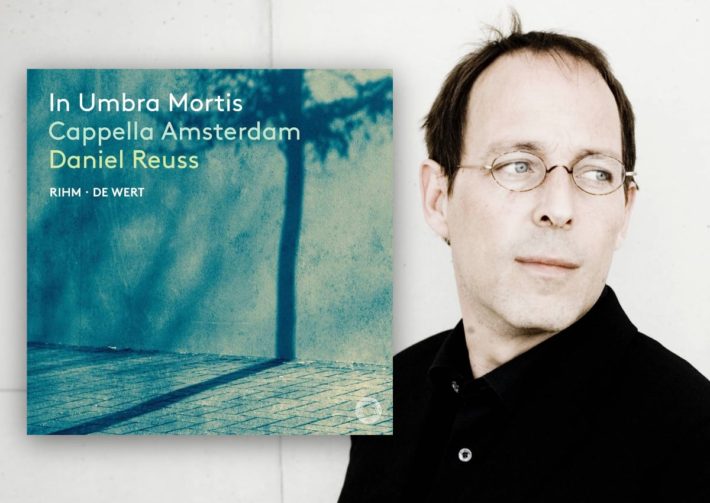Cappella Amsterdam and their leader, Daniel Reuss, have an impressive and highly recommended discography, with previous releases including Lassus reviewed here, Pärt, Poulenc and Janacek. This Dutch ensemble, like The Sixteen, the Tallis Scholars and their respective conductors, have proven that whatever repertoire they turn their attention to, yields music of the highest artistic order.

Their latest release, ‘In Umbra Mortis’ on the Pentatone label, sees Reuss and Cappella Amsterdam exploring unusual repertoire. Focusing on just two composers, they program a contrasting and complementary album of the Flemish Renaissance composer Giaches de Wert (1535-1596) and the contemporary composer Wolfgang Rihm. Rihm’s “Sieben Passions-Texte” forms the framework of the program and is interspersed with motets from de Wert.
Rihm’s choral music is very different from other famed composers such as René Clausen, Stephen Paulus, Erik Esenvalds, or Eric Whitacre. Rihm’s music is less about the harmonies and more about the melodic line, more akin to the renaissance masters. What unites these two unlikely bedfellows is their similar use of texture and applications of chromatic harmony. Neither of them follows the harmonic conventions of their period. Their slowly evolving pieces are radiant and spacious, containing something of the unpredictable, which makes for a captivating listen.
Both the scores of de Wert and Rihm omit much of the expressive detail. How Reuss paces the music, shapes the phrases and finds the rhythmic momentum is exquisite and intrinsic to the music. In the opening piece, Rihm’s “Tristis Est Anima Mea”, Reuss finds the emotional peaks with effortless ease. The clarity Reuss brings to de Wert’s motets is immediately obvious in the pacing of “Vox In Rama” (track 2). Here the beauty in the lines is celebrated and is shaped with care, and the cadences gently placed.
The purity of tone from Cappella Amsterdam is nothing short of beautiful. Intonation is unified and precise with clear diction. Reuss uses different sized ensembles for the two composers. Wert’s motets are in the usual five-parts for the period, occasionally six. Using counter-tenors in a small group brings a pleasing (but extremely subtle) contrast to the sound. Rihm’s settings are in six parts, using a larger choir. The slightly larger ensemble allows for greater expression, which is noticeable between de Wert’s “Amen, Amen Dico Vobis” and Rihm’s “Tenebrae Factae Sunt” (tracks 5 and 6).
The program is considered and sympathetically chosen. The mix of pieces, despite being harmonically contrasting, appears organic; evolving and unfolding in a seemingly continuous sequence. The program has an overwhelming solemn ambiance – not quite melancholic or mournful yet not uplifting either.
Recorded in Pieterskerk Utrecht, Netherlands, the acoustics is resonant and spacious, creating a magical and spiritual atmospheric ambiance, befitting of the music. The choir is recorded with sufficient distance to bring clarity, but also to allow bloom and radiance around the sound. The booklet is nicely presented and contains some excellent notes about the music and the composers. At just under an hour, this is a short album, but as the music is not always the most accessible to novice listeners, it’s proven to be a satisfying hour indeed.
‘In Umbra Mortis’ – Works by Giaches de Wert and Wolfgang Rihm
Cappella Amsterdam
Daniel Reuss – Conductor
Pentatone, CD PTC5186948



















